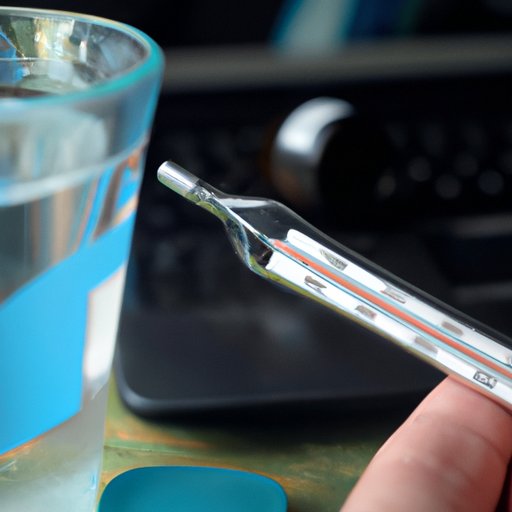
I. Introduction
Have you ever wondered why drinking alcohol can make you feel hot, even when you are in a cool environment? This article will explore why alcohol can increase your body temperature and make you feel hot. We will look at the science behind it, the different types of alcoholic beverages that affect body temperature, the role of dehydration, how alcohol affects blood vessels and body heat, and the impact on the brain. We will also provide some tips for reducing discomfort after drinking and discuss the health risks associated with excessive alcohol consumption.
II. The Science Behind Alcohol’s Effects on Body Temperature
Alcohol affects the hypothalamus, a part of the brain that regulates body temperature. It disrupts the body’s natural temperature regulation by causing the hypothalamus to send signals that increase heat production and decrease heat loss, leading to a rise in body temperature.
In addition, alcohol is metabolized in the liver, which generates heat as a byproduct. This heat production also contributes to the feeling of warmth when drinking alcohol.
Alcohol also causes blood vessels to dilate, leading to increased blood flow to the skin, which can make you feel hot.
III. How Different Types of Alcoholic Beverages Affect Body Temperature
The type of alcoholic beverage you consume can affect your body temperature differently. Beer and wine generally have a less significant effect on body temperature compared to hard liquor. This is because beer and wine have a lower alcohol content and take longer to drink, allowing the body more time to adjust to the increased heat production.
Hard liquor, on the other hand, has a higher alcohol content and is usually consumed more quickly. This leads to a rapid increase in the body’s heat production, making you feel hot faster and more intensely.
IV. The Role of Dehydration in the Body’s Response to Alcohol
Alcohol disrupts the body’s water balance, leading to dehydration. This can make you feel hotter than usual and increase the risk of heat exhaustion or heat stroke.
The body’s normal response to dehydration is to reduce blood flow to the skin, which helps conserve water. However, alcohol’s effect on blood vessels causes them to dilate, leading to increased blood flow and further dehydration.
V. How Alcohol Affects Blood Vessels and Body Heat
Alcohol causes blood vessels in the skin to dilate, increasing blood flow and contributing to the sensation of warmth. However, excessive vasodilation can lead to a decrease in blood pressure and increased heat loss, which can be dangerous in colder environments.
It is also worth noting that drinking alcohol in large amounts can lead to a decrease in body temperature. This is because the hypothalamus adjusts to the increased heat production by decreasing heat production and increasing heat loss, which can lead to hypothermia in extreme cases.
VI. The Impact of Alcohol on the Brain and Triggers of Sensations of Warmth
Alcohol activates certain parts of the brain that control temperature regulation, leading to the sensation of warmth. The release of neurochemicals like dopamine and endorphins, which are associated with pleasure and reward, can also contribute to the feeling of warmth and relaxation when drinking alcohol.
VII. Tips for Reducing Discomfort After Drinking Alcohol
To reduce the discomfort of feeling hot after drinking alcohol, it is essential to stay hydrated. Drinking water throughout the night can help maintain the body’s water balance and reduce the risk of dehydration. Taking a cool shower or using a fan can also help alleviate the sensation of heat.
VIII. Health Risks Associated with Drinking Alcohol
Excessive alcohol consumption can increase the risk of heat-related illnesses, including dehydration, heat exhaustion, and heat stroke. Recognizing the signs of alcohol poisoning, such as confusion, vomiting, and loss of consciousness, is crucial. Seek medical attention immediately if you suspect alcohol poisoning.
IX. Conclusion
Drinking alcohol can make you feel hot by disrupting the body’s natural temperature regulation, increasing heat production, and affecting blood vessels. Different types of alcoholic beverages and dehydration can also impact body temperature. While feeling warm after drinking can be pleasurable, excessive alcohol consumption can lead to heat-related illnesses and should be avoided. Staying hydrated, taking cool showers, and recognizing signs of alcohol poisoning are essential for safe drinking habits.





